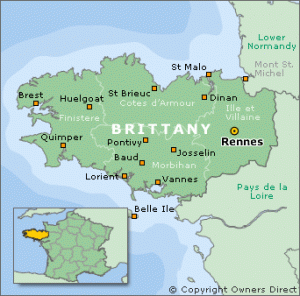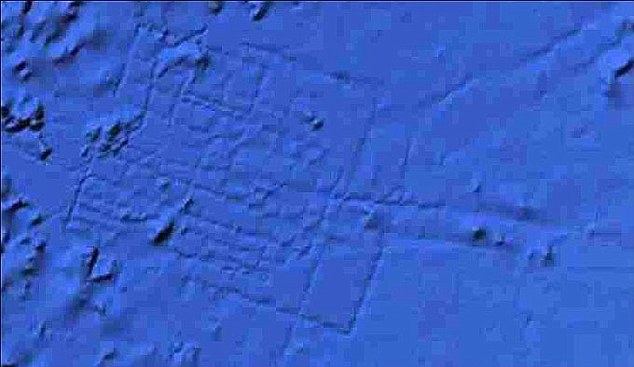Gerry Forster
Bretons *
The Bretons are a cultural grouping located in Brittany in northwest France, where the most outstanding megalithic monuments of Europe are situated. Today, the Bretons consider themselves a separate Celtic  people, with a strong nationalist movement(c).
people, with a strong nationalist movement(c).
It was in 1839 that the Rev. Algernon Herbert (1792-1855), Dean of Merton College, Oxford, was the first to use the term ‘megalithic’ in a paper describing the monuments of England and Brittany.
Since the middle of the 19th century a number of commentators right up to the present have labelled the Bretons as Atlantean. These include R. Cedric Leonard(a), who In support of this idea cites both Stephen Oppenheimer and Herodotus, although he does so some reservations. Hank Harrison wrote Finding Atlantis in which, he supported the idea of a megalithic Atlantis with its centre of power probably located in the Morbihan area of Brittany.
In the 19th century, Ignatius Donnelly quoted Eugene Bodichon as expressing a similar view[021.389]. Bodichon’s opinion is simply based on the temperament and physical similarities between the Bretons and the Berbers of North Africa. Similarly, Gerry Forster refers to Bodichon’s opinion in his The Lost Continent Rediscovered(b). I do not think that the case is proven, even if the legendary kingdom of Ys, reputedly off the Brittany coast, is brought into the debate.
(a) See: https://web.archive.org/web/20170113172907/https://www.atlantisquest.com/Bretons.html
(b) Gerry Forster (archive.org) *
(c) https://ansionnachfionn.com/2011/08/18/at-home-amongst-the-bretons/
Forster, Gerry
Gerry Forster (1930-2004) was a British anomalist who devoted much of his time to  researching the origins of humanity and the planet that we live on. According to any criteria, I would classify him as a prominent member of the ‘lunatic fringe’. He was an advocate for the Hollow Earth theory and proposed that mankind had originated on a planet, Astrida, in what is now the Asteroid Belt.
researching the origins of humanity and the planet that we live on. According to any criteria, I would classify him as a prominent member of the ‘lunatic fringe’. He was an advocate for the Hollow Earth theory and proposed that mankind had originated on a planet, Astrida, in what is now the Asteroid Belt.
>Forster was also a purveyor of Vril generators ($75) which he described as “a blessed gift from ‘the high astral technology of Agartha’, by the surface and inner earth residents of the Agarthian lineage. It is a synchronizer of the high frequency of energy-light, once activated in the inner space of self-originated consciousness, this energy is revealed through the act of practice, connecting simultaneously with the inner door, opening one’s own inner and multidimensional reality to the external dimensional doors, which opens the space-temporal gates between the real world and the virtual one. Connecting One to the VRIL power, the hidden energy and awareness of Immortality.” (b)<
Less controversially, he also wrote a 50-page paper on Atlantis entitled The Lost Continent Rediscovered(a) in which he closely follows the views of Ignatius Donnelly
Atlantic Ocean *
The Atlantic Ocean as defined by modern geography stretches between the Poles and is bounded on the west by the Americas and on the east by Europe and Africa. The word ocean is taken from the Greek ‘Okeanos’ which in turn has been suggested to have a Phoenician origin. Okeanos or ‘ocean river’ is first mentioned in Homer’s Iliad, a term that was employed by many ancient writers to refer to an ocean that they believed encircled the then-known world.
As a slight digression, I should mention that ‘Okeanos Potamos’ is an old name for the River Danube, a fact woven into Densusianu‘s theory of a Romanian Atlantis.
It seems that ‘Atlantic sea’ was a term first used by the poet Stesichorus (630-555 BC)(h), about two hundred years before Timaeus was composed by Plato and coinciding with the time of Solon’s famous visit to Egypt, to describe the seas beyond the Pillars of Heracles (Histories I. 202). If this is correct, then we must ask what term was used prior to Herodotus? If it was Okeanos, what body of water, if any, did the term ‘Atlantic’ apply to at the earlier period?. There have been suggestions that the word referred to the western Mediterranean.
Jacques R. Pauwels in his Beneath the Dust of Time[1656] maintains that contrary to popular belief “The Atlantic Ocean does not owe its name to these mountains, as we are often told; on the contrary, they received the name Atlas because they were situated near the Ocean and, like the Okeanos, conjured up the end of the (inhabited) world, the Oikoumene, and separated the earth from the heavens.”
George Sarantitis has proposed that the term used by Plato, Atlantikos Pelagos, can be more legitimately interpreted as ‘Atlantean archipelago’!(d)
However, some researchers, such as Alberto Arecchi(f), have asserted that the name was given to a very large inland sea in what is now North Africa bound by the Atlas Mountains. Jean Gattefosse was a leading exponent of this during the first half of the 20th century.Sarantitis has expanded on this idea, proposing(c) a vast network of huge inland lakes and waterways in what is now the Sahara, which has, in his view, allows a more acceptable interpretation of Hanno’s voyage. Others such as Diodorus (3.38), as late as the 3rd century BC, used the term ‘Atlantic’ to describe the Indian Ocean. It is quite clear that ancient geographical names did not always have the same meanings that they do today.
The confusion does not end there as some ancient writers have identified the Strait of Sicily as the location of the Pillars of Heracles and the waters of the Western Mediterranean as the Atlantic, with some identifying Tyrrhenia as being in the Atlantic.
Most important of all are the comments of Plato himself who refers to the Atlantic in Timaeus (24e) when Atlantis existed noting that ‘in those days the Atlantic was navigable’, implying that in his own time it was not. Consequently, he could not have been referring to the body of water that we know today as the Atlantic. Furthermore, Aristotle seemed to echo Plato when he wrote(e) that “outside the pillars of Heracles the sea is shallow owing to the mud, but calm, for it lies in a hollow.” This is not a description of the Atlantic that we know, which is not shallow, calm or lying in a hollow and which he also refers to as a sea not an ocean. So, what sea was he referring to?
Since other seas have been called Atlantic, we are therefore forced to consider possible alternatives that are also compatible with the other known features of Atlantis. The three leading candidates are
(i) the Western Mediterranean,
(ii) the Tyrrhenian Sea (which is part of the Western Mediterranean) and
(iii) the inland sea in North Africa, sometimes referred to as Lake Tritonis, favoured by Arecchi, Sarantitis and others.
I am personally inclined towards the Tyrrhenian Sea.
Pliny the Elder writing in the first century AD mentions a number of islands in what we now accept as the Atlantic Ocean. These include the Cassiterides (Britain), the Fortunate Isles (the Canaries), the Hesperides, the Gorgades and an island ‘off Mount Atlas’ named Atlantis. Understandably, Pliny’s comments have led to extensive controversy, particularly the identification of the island off Mount Atlas.
In fact, there is even some dispute about the location of the Mount Atlas in question, as there were a number of peaks known by that name in ancient times. Richard Hennig is cited by Zhirov[458.58] as describing the ‘utter confusion’ among ancient authors regarding the location of Mount Atlas.
Ignatius Donnelly was convinced that Atlantis had been situated in the Atlantic opposite the entrance to the Mediterranean. His theories predominated for over half a century and are still popular today. The late Gerry Forster, a British writer, has a 50-page paper supporting Donnelly’s contention posted on his website entitled The Lost Continent Rediscovered(a).
In order to add scientific credibility to Donnelly’s views the discovery of the Mid-Atlantic Ridge was offered as confirmation of the existence of Atlantis as parts of the ‘ridge’ would have been exposed when ocean levels were hundreds of feet lower during the last Ice Age. Today, the Canaries and the Azores are just remnants of what were once larger landmasses.
When Alfred Wegener advanced the theory of Continental Drift, later replaced by that of Plate Tectonics, was first presented, some atlantologists assumed that a mechanism for the disappearance of Atlantis in the Atlantic had been found. However, when the slow rate of movement was fully realised, the theory also sank as an explanation for the demise of Atlantis.
In April 2009 the media burst into one of its occasional ‘Atlantis found’ phases, when it was reported that evidence of an underwater city had been identified 600 miles west of the Canary Islands using Google Earth. The co-ordinates were given as 31 15’15.53N and 24 15’30.53W.
 The site appeared to show a grid-like street system, which was estimated to be the size of Wales – a highly improbable, if not impossible size for a Bronze Age city. Apart from which, what appeared to be ‘streets’ would have been kilometers in width. Google responded with the following explanatory statement:
The site appeared to show a grid-like street system, which was estimated to be the size of Wales – a highly improbable, if not impossible size for a Bronze Age city. Apart from which, what appeared to be ‘streets’ would have been kilometers in width. Google responded with the following explanatory statement:
“what users are seeing is an artifact of the data collection process. Bathymetric (sea-floor) data is often collected from boats using sonar to take measurements of the sea-floor. The lines reflect the path of the boat as it gathers the data.” It did not take long before one commentator suggested that this statement was a cover-up.
By early February 2012, Google had corrected what they called ‘blunders’ contained in the original data, which in turn removed the anomalous image(b). No doubt conspiracy theorists will have their appetites whetted by this development.
Nine years later, on April 3, 2018(g), the UK’s Express regurgitated the same story!
As usual, people will believe what they want to believe.
(a) Wayback Machine (archive.org) *
(b) https://www.pcworld.com/article/249339/google_pulls_atlantis_from_google_earth.html
(c) The Peninsula of Libya and the Journey of Herodotus – Plato Project (archive.org)
(d) The Importance of Accurate Translation – Plato Project (archive.org)
(e) Meteorologica : Aristotle : Free Download, Borrow, and Streaming : Internet Archive 354a *
(f) https://www.liutprand.it/Atlantis.pdf
(h) https://www.loebclassics.com/view/stesichorus_i-fragments/1991/pb_LCL476.89.xml
